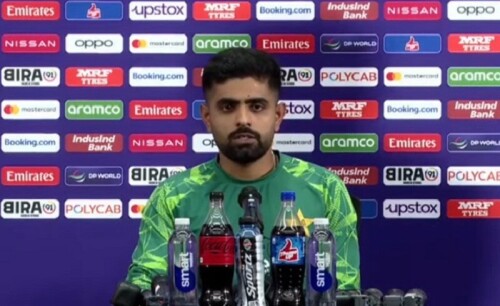
HOTELS are full in Ahmedabad, so full that people are booking private hospital beds for a two-day stay. Betting markets, the satta bazaars, are creaking with demand. Sports channels and social media platforms are exploding with a crescendo of hyperbole. The world’s largest stadium is readying itself to welcome 132,000 fans to witness the biggest match in international cricket.
At the epicentre of this maelstrom, 11 men of Pakistan will simply take the field against 11 men of India to win two points in a group match that might end up counting for nothing in terms of deciding either team’s fate in this year’s 50-overs World Cup. But then again, this is India versus Pakistan; the match that always matters. For some people, the World Cup final is being played today.
This is cricket, but not just cricket. The political situation between the countries, as well as India’s exclusion of Pakistan’s players from the IPL and its general politically driven attempts to avoid playing Pakistan, ensure a frenzy. Add to that an upcoming election year in India with Narendra Modi seeking to start his campaign with a statement cricket victory, and you realise that to the winner go the considerable propaganda spoils.
The odds, including in the satta bazaars, are heavily in India’s favour. Babar Azam’s team may be riding consistently high in the ICC one-day rankings, just below India, but Pakistan has lost each one of its previous seven 50-over World Cup games against India.
It is a remarkable catalogue of failure, especially considering Pakistan’s superiority over India throughout the 1980s and the 1990s. But it is a run that must end one day, and the question is whether the heroes of Hyderabad can ascend in Ahmedabad.
The two previous World Cup contests in India were hotly anticipated. Bangalore’s 1996 quarter final, Javed Miandad’s last game, had Pakistan as favourites. It began in some controversy with Wasim Akram withdrawing late through injury, reached a fever pitch with Aamir Sohail’s bat waving, and ended in Pakistan’s failed run chase.
In 2011, a semi-final in Mohali saw favourites India outplay in-form Pakistan en route to winning their second World Cup. Pakistan fans are still left bewildered by an LBW decision, in favour of Sachin Tendulkar and against Saeed Ajmal, that looked stone dead except for the final millisecond of ball tracking.
The pitch and playing conditions in the Narendra Modi Stadium of Ahmedabad are expected to heavily favour batting, which hands the initiative to India’s deep and experienced batting order.
Even with the seeming absence of Shubman Gill, India will be formidable if a placid track neutralises Pakistan’s pace attack. Since their early stumble against Australia, India’s batsmen have been relentless. Worryingly, Virat Kohli is looking relaxed and dangerous.
But this game is far from a foregone conclusion. Pakistan have shown their own batting prowess in a record breaking run chase against Sri Lanka, where the management’s decision to replace Fakhar Zaman with Abdullah Shafique proved to be a genius move. A flat track suits Pakistan’s batsmen too, and how long will it be before Babar, the world’s top ranked batsman delivers?
India’s bowling looks better balanced, particularly with its spin options, but Pakistan must have optimism that their fast bowling pair of Haris Rauf and Shaheen Shah Afridi has the skill and the wicket-taking ability to exploit any favourable conditions or situations. They are world class match winning bowlers.
However, as usually is the case, the match will be decided by whichever team better handles the pressure of the moment, the expectations of its fans, and the wider scrutiny that such contests bring. Pakistan will expect nothing but noisy hostility from the crowd, but if they can quell India, the pin drop silence of 132,000 fans can prove to be even more deafening.
The teams aren’t too far apart. India, as the record book clearly shows, has historically risen to the occasion better than Pakistan in the World Cup. They are in better current form. But there is something about this Pakistan team, a steelier edge than before, less unpredictability buoyed by the relentlessness of Mohammad Rizwan, that means India certainly can’t count their chickens in Gujarat.
Given all this, and their good start to the tournament, underdogs Pakistan go into this monumental match with nothing much to lose. In a game of nerves, Babar Azam’s team must use that simple notion to wrestle the psychological advantage. History, or a shrug of the shoulders, awaits.
Published in Dawn, October 14th, 2023














































Dear visitor, the comments section is undergoing an overhaul and will return soon.